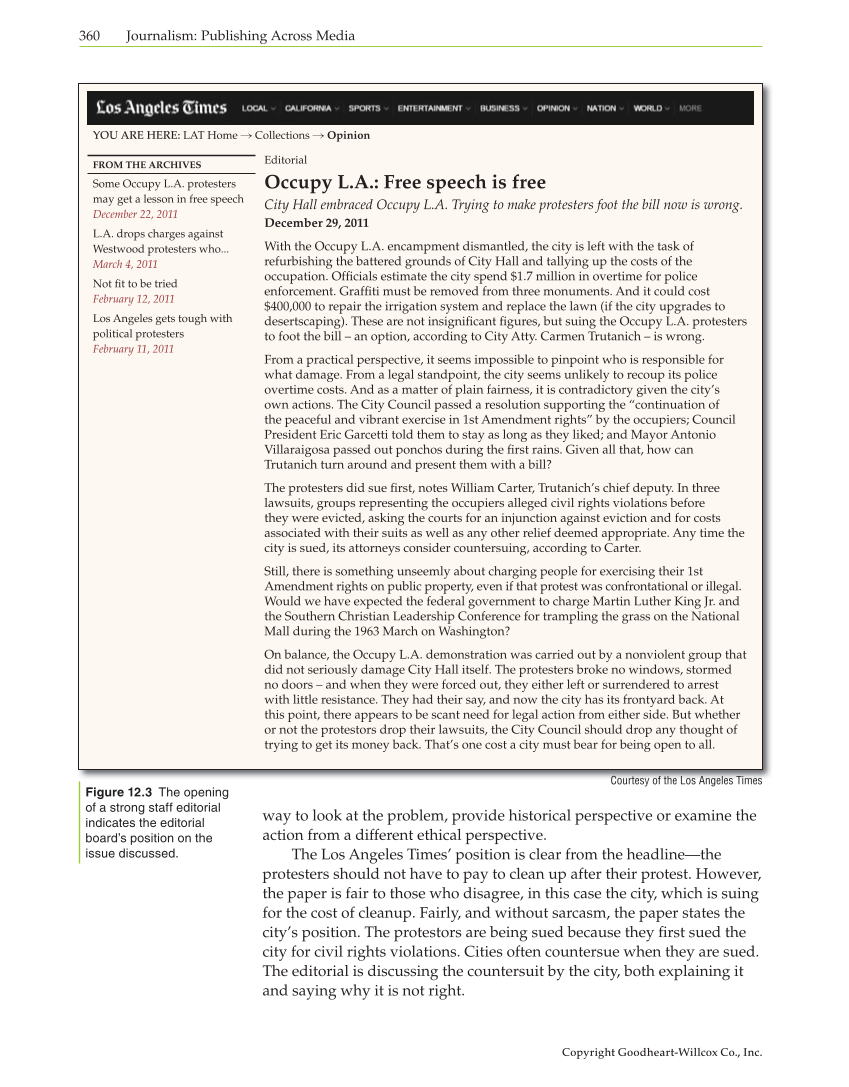Copyright Goodheart-Willcox Co., Inc. 360 Journalism: Publishing Across Media way to look at the problem, provide historical perspective or examine the action from a different ethical perspective. The Los Angeles Times’ position is clear from the headline—the protesters should not have to pay to clean up after their protest. However, the paper is fair to those who disagree, in this case the city, which is suing for the cost of cleanup. Fairly, and without sarcasm, the paper states the city’s position. The protestors are being sued because they fi rst sued the city for civil rights violations. Cities often countersue when they are sued. The editorial is discussing the countersuit by the city, both explaining it and saying why it is not right. Figure 12.3 The opening of a strong staff editorial indicates the editorial board’s position on the issue discussed. YOU ARE HERE: LAT Home Collections Opinion FROM THE ARCHIVES Editorial Occupy L.A.: Free speech is free City Hall embraced Occupy L.A. Trying to make protesters foot the bill now is wrong. December 29, 2011 With the Occupy L.A. encampment dismantled, the city is left with the task of refurbishing the battered grounds of City Hall and tallying up the costs of the occupation. Offi cials estimate the city spend $1.7 million in overtime for police enforcement. Graffi ti must be removed from three monuments. And it could cost $400,000 to repair the irrigation system and replace the lawn (if the city upgrades to desertscaping). These are not insignifi cant fi gures, but suing the Occupy L.A. protesters to foot the bill – an option, according to City Atty. Carmen Trutanich – is wrong. From a practical perspective, it seems impossible to pinpoint who is responsible for what damage. From a legal standpoint, the city seems unlikely to recoup its police overtime costs. And as a matter of plain fairness, it is contradictory given the city’s own actions. The City Council passed a resolution supporting the “continuation of the peaceful and vibrant exercise in 1st Amendment rights” by the occupiers Council President Eric Garcetti told them to stay as long as they liked and Mayor Antonio Villaraigosa passed out ponchos during the fi rst rains. Given all that, how can Trutanich turn around and present them with a bill? The protesters did sue fi rst, notes William Carter, Trutanich’s chief deputy. In three lawsuits, groups representing the occupiers alleged civil rights violations before they were evicted, asking the courts for an injunction against eviction and for costs associated with their suits as well as any other relief deemed appropriate. Any time the city is sued, its attorneys consider countersuing, according to Carter. Still, there is something unseemly about charging people for exercising their 1st Amendment rights on public property, even if that protest was confrontational or illegal. Would we have expected the federal government to charge Martin Luther King Jr. and the Southern Christian Leadership Conference for trampling the grass on the National Mall during the 1963 March on Washington? On balance, the Occupy L.A. demonstration was carried out by a nonviolent group that did not seriously damage City Hall itself. The protesters broke no windows, stormed no doors – and when they were forced out, they either left or surrendered to arrest with little resistance. They had their say, and now the city has its frontyard back. At this point, there appears to be scant need for legal action from either side. But whether or not the protestors drop their lawsuits, the City Council should drop any thought of trying to get its money back. That’s one cost a city must bear for being open to all. Some Occupy L.A. protesters may get a lesson in free speech December 22, 2011 L.A. drops charges against Westwood protesters who... March 4, 2011 Not fi t to be tried February 12, 2011 Los Angeles gets tough with political protesters February 11, 2011 Courtesy of the Los Angeles Times
